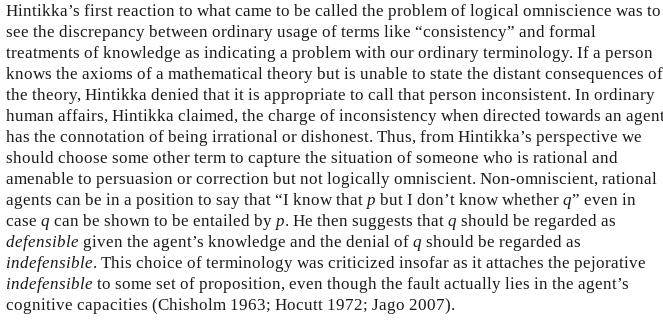I was reading Dretske's text on 'Is knowledge closed under known entailment?' and I saw him using the material conditional while claiming entailment. But, in my head these two seem different. Since entailment is semantic and implication is syntactic. Of course, in logic, where every model is sound and complete, they seem to validify the same things.
However, if we have a model of knowledge, is it necessarily also complete? By which I mean, that if we have some statement A that entails B, does that mean the same as A infers B? To me it feels like, because we have a weak definition of knowledge, we try to fit some structure which gives us a proof theoretic framework which doesn't really fit. Meaning that perhaps knowledge doesn't behave in this proof theoretical way.
Or more generally, why can we assume that knowledge abides the proof theoretic laws of logic? Don't we need to make a model with axioms, relations, constants etc? I read Tarski who tried to solve the inconsistency problem of language by adding a metalanguage so that we can proof if an object language is consistent (Theory of truth). Is there something done like this for epistemology?
I tried to look this specific problem up in epistemology but could not find anything that discusses this question. Any help on this problem of mine would be helpful! I'd also like to hear if you think this problem is a misinterpretation of entailment and inference!
TL;DR I am looking for some papers or philosophers who have discussed the question if knowledge follows the rule of logic, in the sense that when we look at logical arguments applied to knowledge they can imply different results than when we are thinking about what knowledge in that statement means.

